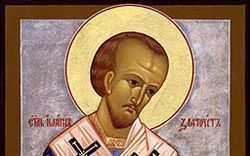St. John Chrysostom (which means “golden-mouthed”) was born in Antioch in 347. He received a classical Greek education, and devoted his studies to religious works and Scriptures. After three years, he was baptized and went to the desert to live as a hermit.
When his health declined, he returned to Antioch and was ordained as a priest in 386. He served in the Cathedral of Antioch for 12 years, and was well known for his incredible preaching.
In 398, he was appointed Patriarch of Constantinople, and inspired his congregation to remain strong in their faith in the face of corruption and decadence in the secular world. In retaliation, the Empress Eudoxia and Theophilus, bishop of Alexandria, had him condemned on false charges, and exiled him to Armenia in 403.
John continued to write letters to his Church in the East, encouraging them to stay strong and spread the faith. He died in 407 as a result of his ill health and the rigors of his exile.
In 438, Emperor Theodosius II, the son of Eudoxia, had John’s body returned to Constantinople, and did penance for his mother’s sins.
St. John’s many writings and homilies are still in use today, and have great influence on Church teaching and tradition.

